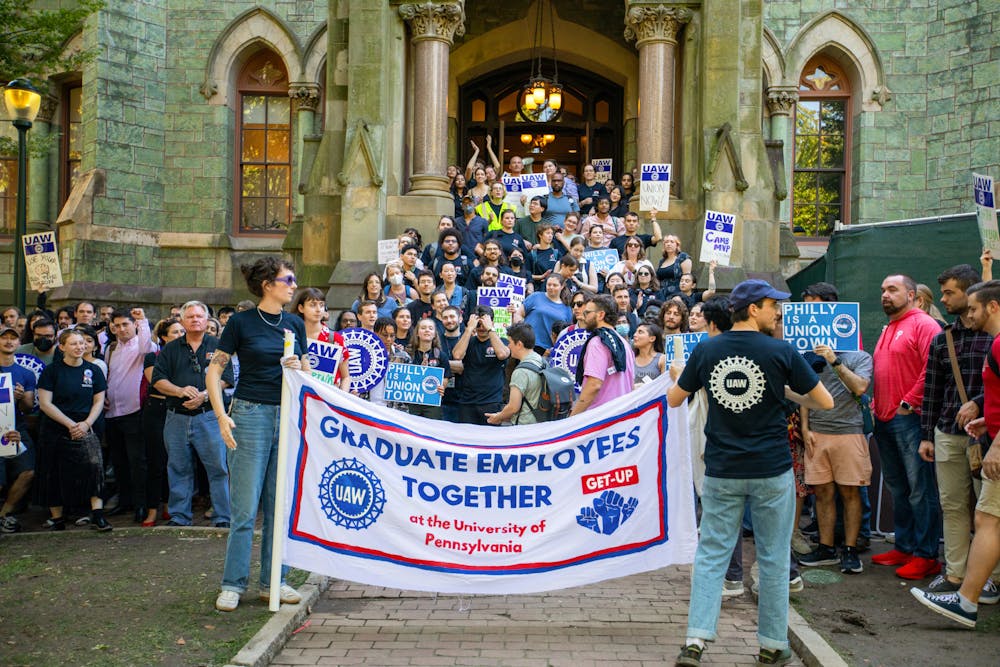Over 200 Penn faculty members expressed their support for Penn’s graduate student workers organization, which is facing an ongoing battle to unionize and gain University recognition.
During the past year, hundreds of members of Graduate Employees Together — University of Pennsylvania have filed cards expressing their desire to form a union. In response, 224 Penn faculty members affirmed their right to organize by signing a support statement drafted by the American Association of University Professors.
Several professors who spoke with The Daily Pennsylvanian said they were motivated to support GET-UP due to their own experience with labor organizing. History professor Kathleen Brown attributed her support for GET-UP to her personal experience as a graduate student at the University of Wisconsin. During her time as a Ph.D. student, Brown contributed to the unionization efforts of teaching assistants.
“I was a steward for my department during the election that led to the creation of the union,” she told the DP. “Having had this experience, it would be difficult for me not to support an organizing effort led by graduate students.”
Originally, the student group was set to vote on whether to unionize on April 16 and 17. However, the election was postponed, and on Monday, GET-UP announced that the election has been rescheduled to May 1 and 2 in Bodek Lounge.
The decision to push back election dates came after GET-UP’s appeal against Penn’s attempt to exclude certain groups of workers from voting. On April 11, the student group announced that they had won their appeal and continued to urge graduate students to vote in the election.
The issues the group seeks to address include safe, fair, and transparent working conditions; financial security; protections against discrimination and harassment; and healthcare benefits.
History and Sociology of Science professor Harun Küçük highlighted the significance of ensuring fair wages for graduate students.
RELATED:
224 Penn Faculty | Statement in support of graduate worker unionization
Penn union coalition, local elected officials call on University to stop union-busting
“The hardest topic to talk about is also the most important, which is monetary compensation,” he told the DP. “Although Penn has recently increased the graduate stipends by a substantial margin, we are still relatively behind our peers. This calls for something to be done, and our students have decided to take matters into their own hands.”
Beginning in the 2023-2024 academic school year, Penn increased the minimum stipend from $30,457 to $38,000. This stipend still remains slightly less than the Ivy League’s average minimum stipend of $39,226.
“Universities are places for self-fulfillment, and the work that we do is on that path,” Küçük said. “If students are financially burdened, they are not in the proper position to fully live this out.”
Russian and East European Studies and political science professor Mitchell Orenstein pointed out the historical impact of unions in the United States. He added that, during his time as a graduate student at Yale, he was an organizer for their graduate student union, Local 33-UNITE HERE.
“The pay at the time was atrocious and effectively unlivable,” he told the DP. “When we organized, after many tough battles, the University nearly tripled our salaries.”
Orenstein also expressed optimism for GET-UP’s future achievements.
“I think that the best proof that the unionization efforts have worked at Penn is the responsiveness of the administration before the union is officially voted on,” he said. “The student group has already made a major impact and I believe they will continue to do that.”
GET-UP has advised graduates to remain attentive to updates, especially those pertaining to the upcoming election.
“I hope that for the sake of campus democracy, as many graduate students [as possible] come out to vote,” Küçük said.









